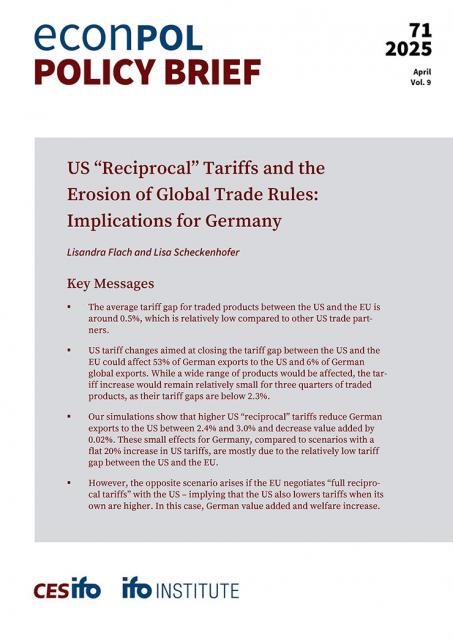News Archive

Policy Report: Economic Effects of Brexit on the European Economy
|
EconPol Policy Report
| News
Eight months ago, the UK Government notified its exit to the EU in accordance with Article 50 of the EU Treaty. Brexit is therefore officially initiated. One month later, the Heads of State and Government of the European Council adopted the guidelines for negotiations between the EU and the UK in accordance with Article 50 TEU. Negotiations between the EU27 and the UK on future political and economic relations have begun in July 2017 and have proven difficult since then. The two-stage structure of the negotiations foresees to substantially move forward these days. Read here what our EconPol Europe Network experts say.
... Details

Press Release: EconPol Europe Founding Conference: A new European network for economic research is launched
| News
The Founding Conference „The Euro – Which Way to Go?“addressed a unique networking occasion for 200 top economists and representatives of institutions and media, headed by German ifo Institute.
... Details

Policy Report: Economic Growth Rates Closely Aligned in Many Euro Area Member States
|
EconPol Policy Report
| News
- Read more about Policy Report: Economic Growth Rates Closely Aligned in Many Euro Area Member States
Economic growth in many euro area countries is fairly closely aligned, while unemployment figures tend to vary more, according to the latest calculations by the EconPol Europe research network. Based on closely aligned developments across EU states between 1999 and 2014, the authors from the Munich-based ifo Institute and Brussels-based Centre for European Policy Studies conclude that state transfers aimed at stabilising Europe’s economy across national borders would only have a very limited impact. For shocks impacting the Eurozone as a whole, such a system could even trigger effects that exacerbate the crisis. “The deeper integration of capital markets would be a more effective way of helping the system to cope with economic shocks,” said ifo President Clemens Fuest, one of the co-authors of the paper.
... Details

Policy Brief: Accountability Bonds – Reconciling Fiscal Policy Based on Market Discipline with Financial Stability
|
EconPol Policy Brief
| News
Accountability bonds revive market discipline in the Eurozone without endangering fiscal and financial stability - and they address the various concerns from difference sides. Clemens Fuest (ifo Institute) and Friedrich Heinemann (ZEW) have proposed the new type of bonds for overcoming the debt crisis in the Eurozone two years ago. In our new EconPol Policy Brief, the two EconPol network members revisit their concept of accountability bonds in the light of current developments, respond to criticism and explain why they are an innovative instrument that stand a real chance of building a consensus, now more than ever.
... Details

Working Paper: We need more Europe in the Monetary Union. Which Europe? Hints from policy games.
|
EconPol Working Paper
| News
Under the pressure of the 2008 crisis serious flaws have emerged in the design of the European Economic and Monetary Union (EMU) as a supranational architecture which aims at generating and distributing collective benefits from integration among highly interdependent countries. If we agree that more Europe is needed, we shall urgently ask "Which Europe?". Economists Luciano Andreozzi and Roberto Tamborini from EconPol Europe network partner Università di Trento introduce here an interesting policy game setup of two interdependent countries where each sovereign government seeks to optimise its own welfare function reflecting social preferences over policy options and their outcomes. Read here why the strategy of further integration by an extended system of binding rules enforced by technocratic agencies may be unsuccessful and which consequences should be drawn.
... Details
